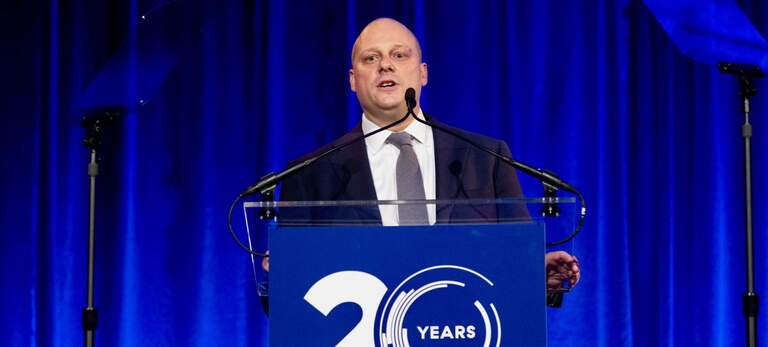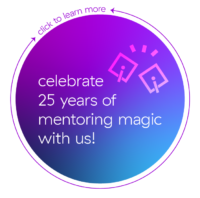iMentor marked its 20th anniversary recently at the Champions Dinner, an event that raised $4.5 million in support of iMentor’s mentoring model, honored founder John Griffin, and recognized Champions Award recipient Jeff Bezos, CEO of Amazon.
Nearly 800 students, mentors, supporters, and partners attended the gala, which featured mentors and mentees from the past two decades and centered on the theme “The Power of Us.”
In remarks, CEO Mike O’Brien spoke about iMentor’s unique approach and the power of a community built upon relationships across difference.
Excerpt
The iMentor experience is off your couch. It’s out of your office. It’s the 3 train to the Bronx on a Tuesday night.
7p.m. and you enter a school building that houses four different high schools. You find your way to a cafeteria on the third floor and you are there with 100 other mentors and 100 students—all of the 11th graders in that school—and you are jammed into one of those tiny circular chairs that’s attached to the table by a piece of steel.
Across that table is a 16-year-old that you have known for six months. And you are trying to build a relationship and be useful. The two of you are making a mutual commitment to this unique relationship. Rinse and repeat. Every month for years.
And across that table, that’s when this seemingly straightforward thing that we are trying to do—help more students succeed in college—that’s when this simple thing goes in a thousand different directions.
Across that table is when you realize that the road to and through college is not primarily an academic exercise.
So, then, what is it?
It is a job four days a week after school, even though you’re in AP classes.
It’s your younger sister to take care of.
It’s the persistent questions you have about whether college matters for the job you want to do, and a whole lot of questions about the job you want to do.
It’s all the slights and threats that come with being a young person of color in this country.
It’s the weight of your whole family and their hopes for you as a first-generation college student.
It’s the fact that you don’t have money for admissions advisors or high-end test prep, but you know plenty of people do.
It is the talent you know you have and the impact you know you can make if you just get the chance.
It’s the optimism that you feel when you let yourself dream about it.
It is the knowledge that, as a Dreamer and an immigrant to this country, you don’t qualify for federal financial aid. You have been worried for years about what that means for you, but you haven’t talked to anyone about it yet, because you don’t want to hear the answer that is coming.
The work for our students is all of those things and it is not stopping. It is continuing to grind. It is bouncing back from each setback and stepping through each insecurity. It is not primarily an academic exercise.
That’s why we do this work, this way.
If you want to respond to and embrace that complexity, you start with relationships.
If you want to understand what is really going on, so you can provide the support that is actually needed, you start with relationships.
If you want to be honest about the inequity that exists in our schools and in our cities, and if you want to remember that this injustice involves you too, in its existence and implications, and if you want to do something with that honesty?
A first step: You get off the sidelines, get alongside a single individual, and you try to do something with them. You put yourself alongside them in the game.
That is what this community has done. 33,000 times. In 22 different cities across the country.
This is the community we are building together. 66,000 people strong.
A community that is founded in the power of relationships across difference. That believes in action over theory. That embraces complexity over reduction. That binds a city together through the people in every neighborhood. That shares a reverence for our public schools and then steps up to support them. That is committed to doing this work, this way.
But most importantly, we have built a community that doesn’t shy away from what Lilla Watson taught us—that our future and our freedom are bound up in each other.
We built a community that is not afraid of how connected we are, that broadens who gets included when we think about us. A community that puts our responsibility to support and uplift each other into action. That takes that from an abstraction and makes it a practice.
We built a community that recognizes that this responsibility we have for each other, for us collectively—that responsibility is not a burden. It is a blessing. It’s the best of us.
We have built a community that is a testament to what is possible when we are at our best. Something that is deeply optimistic.
We are 20 years in. And because of the people in this room, we are just getting started.

